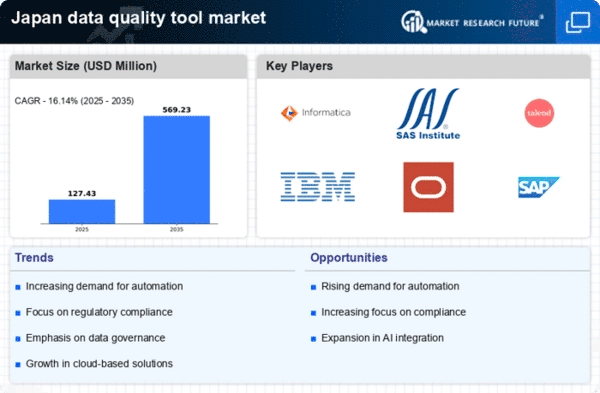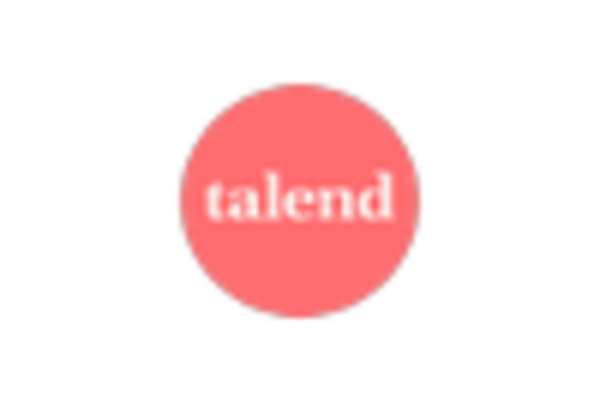Regulatory Compliance Pressures
In Japan, regulatory compliance is a significant driver influencing the data quality-tool market. Organizations are increasingly required to adhere to stringent data protection regulations, such as the Act on the Protection of Personal Information (APPI). Compliance with these regulations necessitates the implementation of robust data quality measures to ensure that personal data is accurate and up-to-date. As a result, businesses are investing in data quality tools to streamline their compliance processes and avoid potential penalties. The market for data quality tools is expected to grow as companies prioritize compliance, with estimates suggesting a growth rate of around 15% annually. This regulatory landscape creates a pressing need for effective data quality solutions, thereby propelling the data quality-tool market forward.
Rising Demand for Data Accuracy
The The data quality tool market in Japan experiences a notable surge in demand for enhanced data accuracy. As organizations increasingly rely on data-driven decision-making, the need for precise and reliable data becomes paramount. This trend is reflected in the market, where the value of data quality tools is projected to reach approximately $500 million by 2026. Companies are investing in these tools to mitigate risks associated with inaccurate data, which can lead to financial losses and reputational damage. Furthermore, the emphasis on data accuracy is likely to drive innovation within the data quality-tool market, as vendors develop more sophisticated solutions to meet the evolving needs of businesses. This rising demand for data accuracy is a critical driver shaping the data quality-tool market in Japan.
Growing Importance of Customer Insights
The The data quality tool market in Japan is significantly driven by the growing importance of customer insights. Businesses are increasingly recognizing that high-quality data is essential for understanding customer behavior and preferences. As organizations strive to enhance customer experiences, they are turning to data quality tools to ensure that their customer data is accurate and actionable. This trend is underscored by the fact that companies that leverage high-quality data are likely to see a 20% increase in customer satisfaction. Consequently, the demand for data quality tools is expected to rise as businesses seek to harness the power of data analytics to gain deeper insights into their customer base. This focus on customer insights is a pivotal factor influencing the data quality-tool market.
Increased Focus on Data-Driven Strategies
The data quality-tool market in Japan is witnessing a shift towards data-driven strategies among organizations. As businesses aim to leverage data for strategic decision-making, the quality of that data becomes critical. Companies are increasingly investing in data quality tools to ensure that their data is reliable and can support informed decision-making processes. This trend is reflected in the growing market size, which is anticipated to reach $600 million by 2027. The emphasis on data-driven strategies is likely to encourage organizations to prioritize data quality initiatives, thereby driving the demand for data quality tools. This focus on leveraging data for strategic advantage is a key driver influencing the data quality-tool market.
Technological Advancements in Data Management
Technological advancements play a crucial role in shaping the data quality-tool market in Japan. The integration of artificial intelligence (AI) and machine learning (ML) into data quality tools is revolutionizing how organizations manage their data. These technologies enable automated data cleansing, validation, and enrichment, significantly improving the efficiency and effectiveness of data quality processes. As businesses increasingly adopt these advanced technologies, the market for data quality tools is projected to grow at a compound annual growth rate (CAGR) of 12% over the next five years. This technological evolution not only enhances the capabilities of data quality tools but also drives their adoption across various industries, thereby propelling the data quality-tool market.
















